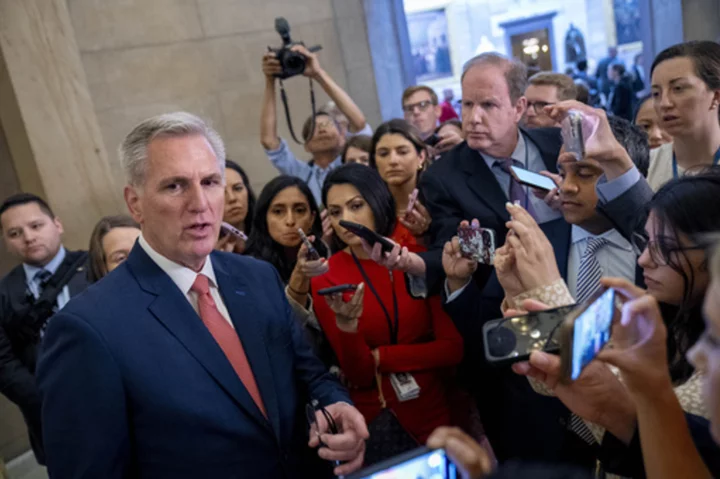WASHINGTON (AP) — Speaker Kevin McCarthy's bid to appease Republican hard-liners and get the House moving again after a recent party rebellion on the floor has some Democrats warning of a difficult road ahead when it comes to passing legislation that will keep the government running.
Republicans teed up votes this past week on guns and on censuring one of former President Donald Trump's most prominent critics, Rep. Adam Schiff, D-Calif. Those votes helped get the House moving again, though the latter effort failed, with Schiff helped by some 20 Republicans.
The most consequential move of the week, however, was an announcement from GOP leadership that arrived with little fanfare. Republicans said they plan to pursue appropriations bills, which fund government programs and agencies, with less spending than the top-line numbers they agreed to in a deal with the White House last month. That compromise avoided what would have been an unprecedented federal default.
McCarthy argued that the numbers he negotiated with the White House amount to a cap and “you can always do less.” GOP Rep. Kay Granger of Texas, who leads the House Appropriations Committee, followed with a statement that said she would seek to limit nondefense spending at 2022 budget levels, saying the debt agreement “set a top-line spending cap -– a ceiling, not a floor.”
The announcements delighted Republicans who had criticized McCarthy, R-Calif., and opposed the debt ceiling legislation because they felt that agreement allowed too much spending. But it drew immediate pushback from Democrats who say an attempt to circumvent the debt ceiling agreement's top-line numbers effectively guarantees a standoff with the Senate and White House and possibly even a damaging government stoppage when funding expires this fall.
“It is a prelude to a shutdown — what they are engineering,” said Connecticut Rep. Rosa DeLauro, the top Democrat on the House Appropriations Committee.
The emerging dynamic raises the potential for another round of economy-rattling brinkmanship in Washington just months after lawmakers narrowly avoided a damaging federal default.
Partial government shutdowns have become increasingly common in the modern era, with the longest coming under President Donald Trump as he demanded money for a U.S.-Mexico border wall. With President Joe Biden facing down the Republican-controlled House as he runs for reelection in 2024 and some conservatives openly dismissive of the damage a shutdown can cause, the spending fight appears nearly certain to escalate.
The tension created by the GOP's pursuit of more non-defense spending cuts was evident during hearings held Wednesday and Thursday of the House Appropriations panel.
Democrats accused House Republicans of going back on their word. “Do you think any of us would have made a deal if we thought your ‘22 number was the deal?" said Rep. Steny Hoyer, D-Md. "What kind of deal is that? What kind of respect for yourselves is that?
“You knew that wasn't a ceiling,” said Rep. Debbie Wasserman Schultz, D-Fla. “Traditionally, that's where we are starting. Caps are not ceilings in our world. They are a starting point and then we negotiate from those numbers we have agreed to. That's how it has always been.”
But Republicans said McCarthy was clear during negotiations that spending had to come down from current levels.
“We can try to fool the American people with smoke and mirrors and pretend, but the speaker was clear. We are in a debt crisis in this country,” said Rep. Andy Harris, R-Md.
Under the debt ceiling agreement, the White House said nondefense spending was expected to be roughly flat in the next budget year and increase by 1% the following year. Defense spending would increase by about 3.3% next year and 1% the following year. The agreement to curb discretionary spending does not include programs like Medicare and Social Security, which are considered mandatory spending.
A few Republicans have urged leadership not to bend to a minority within the conference.
“I think we've just got to be really careful not to allow, you know, a small portion of our conference to continually be chipping away at previously agreed upon issues,” said Rep. Steve Womack, R-Ark. “That top-line number was agreed to in the (debt-ceiling bill.) They may not like it. They voiced their displeasure last week. They kind of shut the House down, but we've got work to do. We need to be doing it.”
Republicans only have a five-seat majority in the House, which magnifies the power that a small bloc can have. It took just 11 members, mostly members of the House Freedom Caucus, to stall House votes on legislation in early June and send lawmakers home early. One of those 11, Rep. Bob Good, R-Va., said moving to 2022 spending levels for nondefense programs will be good for Republican candidates in next year's general election because that's what voters are demanding.
“Democrats have no interest in cutting spending,” Good said. “They have to be forced to do so. We should have used the debt ceiling to force them to cut spending. We should use the appropriations process to force them to cut spending. We shouldn't fear a government shutdown. Most of what we do up here is bad anyway."
Many senators, Democrat and Republican, did not seem as concerned about the possibility of a shutdown.
“This crowd that is giving McCarthy trouble is irrelevant for purposes of getting appropriations bills passed," said Sen. Chris Murphy, D-Conn. “When it comes to appropriations bills, you have to create a coalition that doesn't include the Freedom Caucus.”
“In the end, I think we'll resolve these issues,” said Sen. Susan Collins, the top Republican on the Senate Appropriations Committee.









